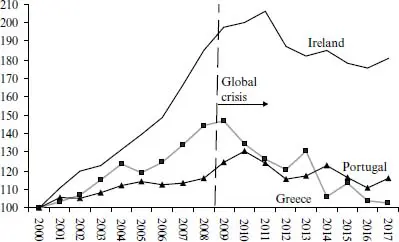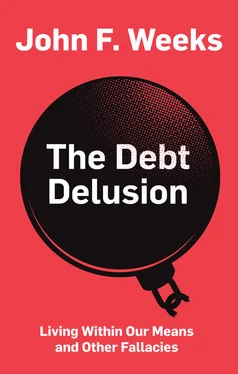The expenditure cuts were indeed severe (figure 0.5). In Greece, public expenditure reached its peak in 2011, 35 percent above that in 2000. Six years later, in 2017, inflation-adjusted expenditure had collapsed almost back to the level it had been in 2000. The Portuguese population suffered expenditure decline as extreme. From its peak in 2009, inflation-adjusted spending fell almost to the level of seventeen years before. Budget cuts were also violent in Ireland, whose rapid growth of spending up to 2007 came with budget surpluses, not deficits. The expansion of spending hit its peak in 2011 at more than double the 2000 level, then dropped rapidly over the next five years.
The important characteristic of the sharp drops in expenditure in the five EU countries was the conscious goal of achieving a budget in which revenue covered expenditure. By 2018 only the government of Greece had reached that goal. In the process of doing so, the national economy suffered the largest contraction of any in the European Union. In the chapters that follow I devote considerable analysis to that combination – expenditure cuts achieving deficit reduction at the cost of economic contraction.

Figure 0.5 Index of total public expenditure, three austerity-implementing eurozone countries, 2000–2017 (constant prices; year 2000 = 100)
Source : Eurostat.
Austerity Politics and Reality
The austerity-implementing EU governments were repeatedly confronted with the TINA argument by the institutions and governments funding their “bailouts.” Unqualified, definitive judgments such as TINA-justified austerity policy frequently derive from abstract reasoning divorced from the nuances of concrete experience. These definitive policy judgments frequently emerge from carrying an otherwise reasonable hypothesis to its logical extreme.
Mainstream economics provides an example of such a judgment. All economists share the insight that market economies possess self-adjustment mechanisms. To pursue that insight to the special case conclusion that adjustment quickly leads to full employment represents reductio ad absurdum . An otherwise valid insight, that market economies are characterized by relative stability, reaches an extreme conclusion that contradicts reality. The circle of improbability is squared by using the ideal outcome as the ruler to judge reality. In a triumph of logic over reality, the abstract principle treats as the problem the failure of reality to conform to the ideal.
Austerity policies involve a political choice. They do not come from imperatives of real-world economic conditions. They do not represent the accumulated wisdom of economic analysis and theory. The TINA principle does not apply to them. Austerity policies find their verisimilitude, the appearance of truth, in a series of interconnected myths, which the rest of this book deconstructs.
Конец ознакомительного фрагмента.
Текст предоставлен ООО «ЛитРес».
Прочитайте эту книгу целиком, на ЛитРес.
Безопасно оплатить книгу можно банковской картой Visa, MasterCard, Maestro, со счета мобильного телефона, с платежного терминала, в салоне МТС или Связной, через PayPal, WebMoney, Яндекс.Деньги, QIWI Кошелек, бонусными картами или другим удобным Вам способом.













